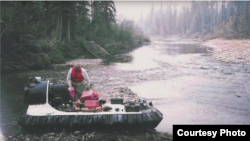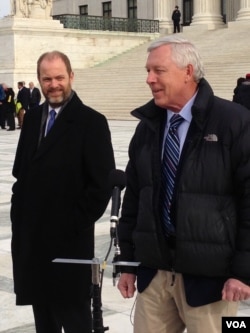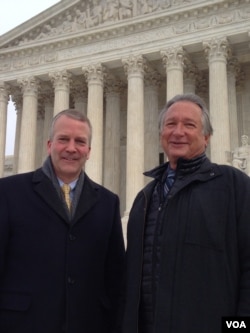Outdoorsman John Sturgeon's fight with the U.S. government is about much more than whether the National Park Service can ban his use of a hovercraft to travel over otherwise inaccessible parts of Alaska's Nation River.
The former Alaskan chief forester's legal battle has tapped into deep-seated anger at Washington and a passionate desire among Alaskans to preserve a way of life — including lots of hunting and fishing and unrestricted use of the rivers that cut through the state's wild hinterlands.
That's why Sturgeon and his lawyer, Matthew Findley, were joined Wednesday at the U.S. Supreme Court by a slew of Alaskan media outlets, Alaska Senator Dan Sullivan and a group of personal friends and benefactors.
They watched as attorneys argued the case, which comes amid an ongoing siege in Oregon, where armed protesters are occupying a federal wildlife reserve and calling for Washington to cede control of its vast landholdings in the West to ranchers and local governments.
"We think this case is about federal overreach — that's about it," Sturgeon said outside the court.
So do state officials from Alaska, where 60 percent of the land — an area bigger than California — is under federal control.
Alaska's amicus brief supporting Sturgeon says lower-court rulings against him "threaten not only the state's sovereignty ... but also the way of life of ordinary Alaskan citizens."
"All of our food except fish and game is imported — and expensive," said Rod Arno, executive director of the Alaska Outdoor Council, which raised more than $220,000 since October to support the court case.
It's a lifestyle
So while some Alaskans are motivated to hunt and fish primarily by economic necessity, for others it's a lifestyle.
"During spring and summer, Alaskans move out of the cities and into fish and hunting camps," Arno said.
In 2007, Sturgeon was on his way to hunt moose in the Yukon-Charley Rivers National Preserve — also part of the national park system in Alaska — when his hovercraft broke down.
Even though Sturgeon had used his 10-foot rubber boat for years in the Yukon-Charley, NPS officers who found him repairing a steering cable told him noisy hovercraft — which skim over rocky rivers and other difficult terrain on a cushion of air — were banned in all national parks, even in Alaska.
The officers threatened Sturgeon with criminal prosecution when he challenged their authority to enforce the ban on hovercraft. However, Sturgeon was not actually hovering over federal land, but over state land managed by the Park Service within the Yukon-Charlie.
To prove it, Sturgeon's legal team dug up the Alaska National Interest Lands Conservation Act (ANILCA), a unique set of statutes that outline the federal government's complex relationship with the state and its Native population.
Ratified by Congress in 1980, ANILCA codified a 1971 settlement by which the U.S. government guaranteed land to 13 regional Native corporations and more than 200 Native village corporations. It also set up conservation districts, including some on state and Native lands managed by the NPS.
Sturgeon contends that ANILCA's Section 103(c) exempts state-owned and other non-federally owned lands in Alaska from NPS regulations, even if they are inside a national park. Critically, he also argues that Alaska owns all the waterways in the state since it owns the submerged lands underneath all navigable waters within its borders.
A district judge and a unanimous panel of the 9th U.S. Circuit Court of Appeals disagreed. They ruled against Sturgeon, saying the law clearly supports the Park Service.
Senator confident
But on Wednesday, Sullivan appeared confident the nation's highest court would overturn those rulings.
"Nobody was defending the 9th Circuit [today]," the senator said. "Yet the National Park Service continues to use a flawed opinion to promulgate more regulations, including those covering oil and gas [exploration]."
While Alaska's Oil and Gas Association is among the organizations that have rallied to Sturgeon's cause, so have the Sierra Club, Wilderness Watch and a diverse array of hunting groups and Native corporations that normally would not see eye to eye politically.
They appear united by a shared concern — that federal rule changes limiting transportation on the state's waterways would hinder development, as well as subsistence hunting and fishing or other uses for the land.
"The hovercraft is in my yard right now — I pulled the engine out," Sturgeon said. "When I win, I'm gonna put it back in and go moose hunting again."
The justices are expected to rule on the case later this year.


